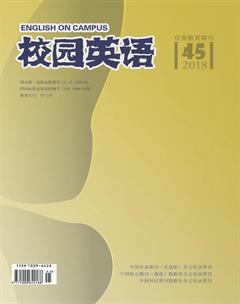英漢翻譯中的詞性轉換
【摘要】英漢造句方式上的差異必然也導致了詞類使用頻率的不同。主要體現在連接手段的區別和詞性的不同。英語多使用介詞,代詞,連接詞等連接句子,而漢語則更多的依靠詞序,邏輯順序來連接句子。英語多用名詞和介詞等來表達,漢語則多用動詞等來表達,因此在翻譯中必須作大量的詞性轉換工作。
【關鍵詞】英漢連接手段的區別和詞性的不同;詞性轉換
【作者簡介】尹春晨,上海政法學院外國語學院。
英漢造句方式上的差異必然也導致了詞類使用頻率的不同。雖然形合句和意合句并存于英漢兩種語言之中,但所占的比重卻相差懸殊。具體的說, 英語強調形式上的嚴整,詞與詞,小句與小句之間的關系往往都借助于語言形式加以表達。英語句子中連接手段不僅形式多樣,種類繁多,而且使用頻率頗高。英語的連接手段包括使用關系詞,連接詞,介詞,代詞以及有關的形態變化形式等。相形之下,漢語的形式連接手段明顯要少,漢語既沒有詞形變化,也沒有英語中頻繁使用的關系詞,連接詞,介詞,連詞等虛詞不僅數量較少,而且使用得遠不如英語中的類似詞那樣普遍。漢語更多地依靠詞序注重邏輯順序,強調意義連貫。
英漢語的一個顯著差別就是:英語句子中,名詞與介詞占優勢;漢語句子中,動詞占優勢。
由于英語句子中的謂語動詞受動詞形態變化的約束,句子中只能有一個謂語動詞,它是英語句子的軸心和核心,然后要借用名詞來表達。而名詞和名詞之間的聯系卻要借助介詞來串通, 所以英語句子名詞和介詞占優勢。要理解和掌握英語, 只要抓住謂語動詞就抓住了英語句子的靈魂。在翻譯時,對介詞要特別注意。因為英語句子的擴展,準確意義的表達,往往是通過介詞來實現的。例如:
Inadequate training for farmers and the low productivity of many farms place the majority of country dwellers in a disadvantageous position in their own countries.
(農民缺乏訓練, 許多農場生產率很低,這就使得大多數農民處于貧窮的困境。)
此句只有一個謂語動詞,但卻有八個名詞,六個介詞或連詞,譯成中文時,卻用了三個謂語動詞。
一、名詞和動詞的相互轉化
漢語動詞沒有什么形態變化,使用方便,且重于動態描寫,所以漢語動詞用得多,而且動詞連用在漢語中比比皆是。漢語在表達一些復雜的思想時往往借助動詞,按時間順序,邏輯順序,逐步交代,層層鋪開,給人以舒緩明快的感覺。因此,英譯漢時,很多英語名詞需要按照漢語的表達習慣轉換成漢語動詞。例如:
The doctors extremely quick arrival and uncommonly careful examination of the patient brought about his very speedy recovery.
醫生迅速到達,并非常仔細地檢查了病人,因此病人很快就康復了。
Repeated changes in flow direction ensure even diffusion over the entire exit area.
反復改變流動方向,可確保在整個出口域內擴散均勻。
有時候,英語名詞往往是由動詞衍生而成或含有動作意味的名詞充當。例如:
1. Yet close analysis of such people often reveals the existence of what might be called “stability zones” in their lives.
然而進一步分析這些人后常常發現他們生活中存在著一種或許可以稱之為“文檔區域”的東西。
2. The way he distributes his time and emotional energies is a direct clue to his value system and his personality.
時間和情感的分配方式直接反映他的性格和價值體系。
3. There have been poverty, pestilence, and famine, which were due to mans inadequate mastery of nature. There have been wars, oppressions and tortures which have been due to mens hostility to their fellow men.
由于人類未能充分掌控自然,貧困,瘟疫和饑荒長期存在。由于人類敵視自己的同類,戰爭,壓迫和苦難一直不斷。
4. Im not much of a singer.
我唱歌不太行。
5. She is a lover of Chinese food.
她很喜歡吃中國菜。
6. One of the major reasons for this joylessness in our university life is that the students see themselves as prisoners of economic necessity.
大學生活沉悶無趣的主要原因之一是因為大學生認為自己受制于經濟方面的需求。
7. The sight and sound of so many cute babies reminded her of her own two-year-old.
看到這么多可愛的寶寶,聽到他們的聲音,她不由想起了自己兩歲的孩子。
8. She was busy burping the baby after its feed.
喂奶后她輕拍嬰兒使之打嗝。
需要注意的是,如果名詞表示職業或身份,汗譯是一般仍譯作名詞。例如:
1. Lovers do not want to be disturbed.
情侶不想被打擾。
2. The prisoner refused to eat and drink.
囚犯絕食了。
3. She is a famous singer.
她是著名的歌唱家。
二、介詞和動詞的轉化
英語中的很多介詞有很強的動作感。雖然理論上屬于虛詞,但在實踐中卻常常可以表示動作行為的進展狀態和程度,起到動詞的作用。例如:
1. In Italy and Great Britain, they have passed a ban against all cigarette advertisements on TV.
意大利和英國通過了禁令,不準在電視上做香煙廣告。
2. Each year dogs are sent out into the snow whenever a traveler is in difficulty.
每年都要派狗到雪地里去幫助遇到困難的旅游者。
3. The cat is lying in the sun.
貓咪躺在地上曬太陽。
4. We drove home a bit after midnight, over the river and through the old sleeping town.
時過午夜,我們驅車回家。先過了河,又穿過了這個在酣睡中的古老城市。
5. Every day he drives her to and from work.
他每天開車接送她上下班。
6. He got on the motorbike and roared off into the night.
他跨上摩托車,加大油門,駛入夜色中。
7. The two old women were chatting over the garden fence.
兩個老太太隔著籬笆墻拉起了家常。
8. She went to Yifu Building for a lecture.
她去逸夫樓聽講座。
三、英語形容詞的轉化(轉化成名詞,動詞,副詞等)
1. All the wounded were sent to the hospital right away.
全體傷員立即送到醫院去了。
2. “Yes,” he said with a slow nod.
他慢條斯理地點了一下頭說,“是的”。
3.I am not ashamed to confess I am ignorant of what I do not know.
我不知道的,就承認自己不知道,我并不覺得丟臉。
四、英語動詞的轉化(轉化成名詞)
1. What characterizes almost all Hollywood films is an inner emptiness.
幾乎所有好萊塢電影都有一個特點,就是內容空洞。
2. She felt that he seemed to personify the evil that was in the world.
她覺得他似乎是世上一切邪惡的化身。
五、英語名詞的轉化(轉化成形容詞)
1. She promptly shepherded them out of the crowded living room and into the privacy of the library.
她立刻把他們領出擁擠的客廳,帶進了沒人注意的圖書館。
2. The conference was a success.
會議很成功。
六、英語副詞的轉化(轉化成名詞和形容詞)
1. He is physically strong but mentally retarded.
他身體強壯,但智力卻有缺陷。
2. After a busy and productive day, he felt deliciously tired.
忙了一天,做了不少事,他雖然覺得累,但心里美滋滋的。
七、其他詞性轉換情況還有
1. According to the Bible, the poor suffer in this world but are rewarded in the next.
圣經里說,窮人在現世受苦,來世卻能得到回報。
2. It is obvious that he is emotionally disturbed.
很明顯,他的情緒受到了影響。
3. He objected that the plan is not practical.
他反對的理由是:這個計劃不現實。
4. He enjoys his conversation with her and the sweetly pensive look on her face.
他喜歡和她交談,喜歡看她既甜美,又若有所思的表情。
5. To test the maids honesty, he deliberately left $ 50 under the sofa.
他故意在沙發下丟了50英鎊錢,想看看保姆是否誠實。
6. He was sure that he had done the right thing.
他確信自己做得對。
當然,除了以上例舉的,還有一些其他英漢漢英詞性的相互轉化情況,但出現的頻率小一些,需要我們在平時翻譯時小心注意,不可犯錯。
參考文獻:
[1]Catford,A Linguistic Theory of Translation[M].Oxford:Oxford University Press,1965.
[2]Leonardi,V.Equivalence in Translation:Between Myth and Reality [OL].http://accurapoid.com/journal/14equiv.htm.
[3]Newmark,P.A Textbook of Translation[M].上海外語教育出版社, 2001.
[4]Nida & Taber,The Theory and Practice of Translation[J].Leiden: Brill,1969.
[5]Wechsler,Robert.Performing Without a Stage:The Art of Literary Translation[M].North Haven,CT:Catbird Press,1998
[6]但漢源.英漢翻譯理論與技巧[M].長沙:中南工業大學出版社, 1999.
[7]何剛強.英漢口筆譯技藝[M].上海:復旦大學出版社,2003.
[8]孫致禮.新編英漢翻譯教程[M].上海:上海外語教育出版社,2003.

